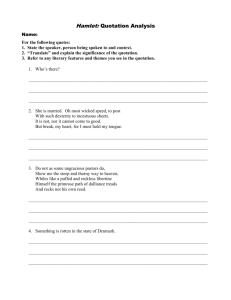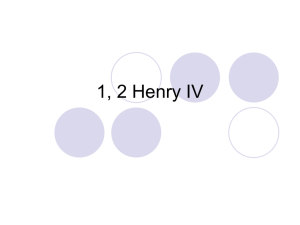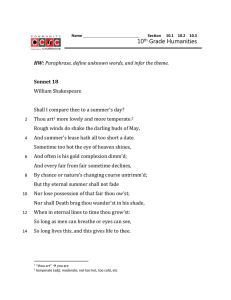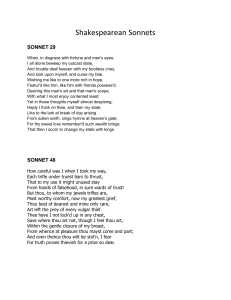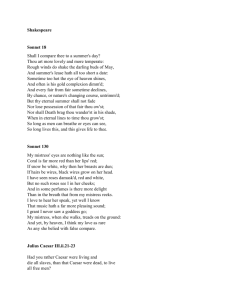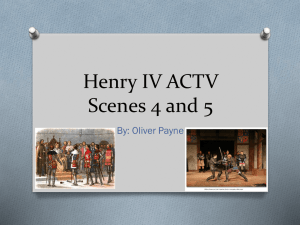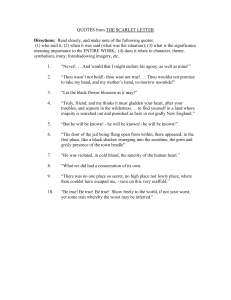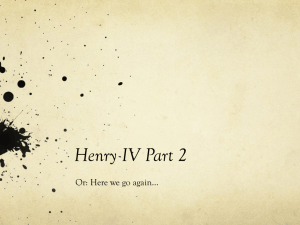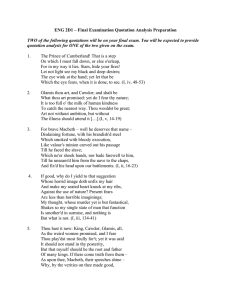Richard II and Henry IV, 1 The Performance of Power and the
advertisement
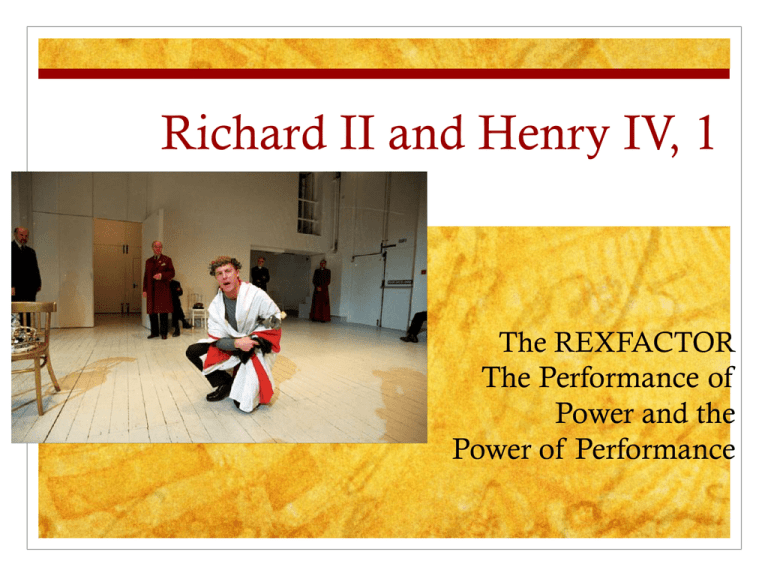
Richard II and Henry IV, 1
The REXFACTOR
The Performance of
Power and the
Power of Performance
Power as Essence
Nerissa When the moon shone we did not see the candle.
Portia So doth the greater glory dim the less:
A substitute shines brightly as a king
Until a king be by, and then his state
Empties itself, as doth an inland brook
Into the main of waters
(The Merchant of Venice V.i.93-97)
The candle and the moon
Power as Prosthesis / Performance – Thackeray’s Louis XIV
The idea of kingly dignity is equally strong in the two outer figures; and
you see, at once, that majesty is made out of the wig, the high-heeled
shoes, and cloak, all fleurs-de-lis bespangled. As for the little lean,
shrivelled, paunchy old man, of five feet two, in a jacket and breeches,
there is no majesty in him at any rate; and yet he has just stepped out of
that very suit of clothes. Put the wig and shoes on him, and he is six feet
high;--the other fripperies, and he stands before you majestic, imperial,
and heroic! Thus do barbers and cobblers make the gods that we
worship: for do we not all worship him? Yes; though we all know him to
be stupid, heartless, short, of doubtful personal courage, worship and
admire him we must; and have set up, in our hearts, a grand image of
him, endowed with wit, magnanimity, valour, and enormous heroical
stature. (William Makepeace Thackeray, Paris Sketch Book (1840): 404)
Anamorphic Perspective
Bushy
Each substance of a grief hath twenty shadows
Which shows like grief itself but is not so,
For sorrow’s eye, glazèd with blinding tears,
Divides one thing entire into many objects,
Like perspectives, which rightly gazed upon
Show nothing but confusion; eyed awry
Distinguish form
(2.2.14-20)
is a distorted projection or
perspective requiring the viewer to use special
devices or occupy a specific vantage point to
reconstitute the image. The word
"anamorphosis" is derived from the Greek
prefix ana-, meaning back or again, and the
word morphe, meaning shape or form.
Anamorphosis
DEATH’S
PERSPECTIVE
Within the hollow crown
That rounds the mortal temples of a king
Keeps Death his court and there the antic sits,
Scoffing his state and grinning at his pomp,
Allowing him a breath, a little scene,
To monarchize, be feared and kill with looks…
(III.2.160ff.)
THE PROPS OF POWER
I’ll give my jewels for a set of beads,
My gorgeous palace for a hermitage,
My gay apparel for an almsman’s
gown,
My figured goblets for a dish of wood,
My sceptre for a palmer’s walking staff,
My subjects for a pair of carved saints,
And my large kingdom for a little
grave,
A little, little grave, an obscure grave…
(3.3.146ff)
RICHARD’S REIGN ASSOCIATED
WITH LUXURY: The unparalleled
nature of such extravagance is stressed
in Holinshed’s final reference: ‘the like
in former times was never done to anie
king of this realme’
A LITTLE SCENE…
Now mark me how I will undo myself:
I give this heavy weight from off my head
And this unwieldy sceptre from my hand,
The pride of kingly sway from out my heart,
With mine own tears I wash away my balm,
With mine own hands I give away my crown,
With mine own tongue deny my sacred state,
With mine own breath release all duteous
oaths,
All pomp and majesty I do forswear.
(4.1.203ff)
A little
scene
Bolingbroke as Actor
‘Richard has been called the poet king by critics who want to
read him in the nineteenth century manner, as a poet king who
was a political failure, rather than as a sixteenth-century
monarch who destroyed the sign of his own legitimacy. In
actuality, it is Henry IV rather than Richard in whom
Shakespeare invests the power of the artist, not a power
detached from matters political, that is, but the power to
incorporate disruptive cultural elements within the official
rituals of the state.’
Power on Display: The Politics of Shakespeare’s Genres, Leonard Tennenhouse
p.81
Bolingbroke as Actor
Off goes his bonnet to an oyster-wench;
A brace of draymen bid God speed him well
And had the tribute of his supple knee,
With “Thanks, my countrymen, my loving friends”;
As were our England in reversion his,
And he our subjects’ next degree in hope.
(Richard describing B in RII 1.4.31-36) [cf Coriolanus; in/flexibility]
Strategic, economical theatricality contrasted with
prodigal, promiscuous exhibitionism:
By being seldom seen, I could not stir
But, like a comet, I was wondered at,
That men would tell their children ‘This is he.’
Others would say ‘Where, which is Bolingbroke?’
And then I stole all courtesy from heaven,
And dressed myself in such humility
That I did pluck allegiance from men’s hearts […]
The skipping King, he ambled up and down
With shallow jesters and rash bavin wits
Soon kindled and soon burnt, carded his state […]
Grew a companion to the common streets,
Enfeoffed himself to popularity,
That, being daily swallowed by men’s eyes,
They surfeited with honey, and began
To loathe the taste of sweetness
(Henry IV, 1 3.1.46-72)
Essentialist v Performative
notions of legitimacy
‘When
he came to write his second tetralogy of
history plays, Shakespeare dramatized the
theatricality of power as a recurrent contest
among historical actors to control the
personation of the King’
(Louis
Montrose, The Purpose of Playing, p.93)
‘It is difficult to imagine that a historical play as good as
Henry IV will ever again be written’ W.H. Auden
Following Richard II:
What makes a King?
What role does theatricality, language play?
The props of power and play-scene; the invasion of the real, the need
to stop playing
The transfer of power
The broadening of canvas, the sweep of the country, the diversity of
voice / polyphony, prose joins verse, the inclusivity, Richard II’s
Gardeners and Groom now joined by……
Carnival v Lent (Brueghel, 1559)
Title page,
1598 Quarto
Probably first performed in
1597
More Quarto editions printed
in Shakespeare’s lifetime than
any other of his plays
Joseph Hall complained in
1597 of what he termed the
‘goodly hotch-potch’ that
results ‘when vile Russetings
[i.e. rustics or clowns] / Are
match’t with monarchs, &
with might kings’
Carnival v Lent
(Brueghel, 1559)
Falstaff as Carnival
Dialectic of Locations:
Flexi time
Henry: But I have sent for him [Hotspur] to
answer this,
And for this cause awhile we must neglect
Our holy purpose to Jerusalem.
Cousin, on Wednesday next our council we
Will hold at Windsor. So inform the lords,
But come yourself with speed to us again,
For more is to be said and to be done
Than out of anger can be uttered.
Westmorland:
I will my liege.
Falstaff: Now Hal, what time of day is it,
lad?
Hal: Thou art so fat-witted, with drinking
of old sack and unbuttoning thee after
supper and sleeping upon benches after
noon, that thou hast forgotten to demand
that truly which thou wouldst truly know.
What a devil hast thou to do with the time
of the day? Unless hours were cups of sack
and minutes capons and clocks the tongues
of bawds and dials the signs of leapinghouses and the blessed sun himself
a fair hot wench in flame-coloured taffeta,
I see no reason why thou shouldst be so
superfluous to demand the time of the day.
Eastcheape as Falstaffian
space
Home to meat market, butcher’s
stalls, cook shops:
Falstaff is ribs, tallow,
chops, guts, brawn, sow,
Martlemas beef,
Manningtree ox with the
pudding in his belly,
hogshead, tun, bombard
etc; he is not meagre,
Lenten fare such as shotten
herring, soused gurnet
(pickled fish), radish etc
Putting Away Childish
Things: Carnival to Lent
Rehearsing the transition:
FALSTAFF Well, thou wert be horribly chid tomorrow
when thou comest to thy father: if thou love me, practise
an answer.
PRINCE HENRY Do thou stand for my father, and
examine me upon the particulars of my life.
FALSTAFF Shall I? content: this chair shall be my state,
this dagger my sceptre, and this cushion my crown.
PRINCE HENRY Thy state is taken for a joined-stool,
thy golden sceptre for a leaden dagger, and thy precious
rich crown for a pitiful bald crown. (2.4)
As in Hamlet, a play-within-theplay stands at centre
Imitation, mimicry as satire: Hal
‘does’ Hotspur, Falstaff ‘does’
Henry
{Abraham Lincoln wanted to
know why this scene was usually
cut in 19thC American
performances: because ‘there is
generally nothing sufficiently
distinctive about the actor who
plays Henry to make an imitation
striking’}
Hal gets to rehearse two scenes:
replacing his father on the
throne, and the banishment of
Falstaff
The Sheriff ’s arrival, the knock at
the door, represents the end of
playing
I do, I will … I know thee
not
Shaping History
Get thee to Gloucester, Essex. Do thee to Wessex, Exeter.
Fair Albany to Somerset must eke his route.
And Scroop, do you to Westmoreland, where shall bold York
Enrouted now for Lancaster, with forces of our Uncle Rutland,
Enjoin his standard with sweet Norfolk's host.
Fair Sussex, get thee to Warwick’s bourne,
And there, with frowning purpose, tell our plan
To Bedford's tilted ear, that he shall press
With most insensate speed
And join his warlike effort to bold Dorset's side…
… I most royally shall now to bed,
To sleep off all the nonsense I've just said.
‘So that’s the way you like it’, Beyond the Fringe
Foils: Shakespearean
shaping and counterpoint
‘Shakespearian dramas are constructed not on the principle of
unity of action, but on the principle of analogy, comprising a
double, treble, or quadruple plot, which repeats the same basic
theme; they are a system of mirrors, as it were, both concave
and convex, which reflect, magnify and parody the same
situation’ (Jan Kott, Shakespeare Our Contemporary, p.245)
Hamlet to Laertes:
I'll be your foil, Laertes. In mine ignorance
Your skill shall, like a star i' the darkest night
Stick fiery off indeed.
(Hamlet a tale of three sons, three foils…)
Falstaff v Hotspur on Honour (death of
essence and Marlowe)
Hotspur:
By heaven, methinks it were an easy leap,
To pluck bright honour from the pale-faced
moon,
Or dive into the bottom of the deep,
Where fathom-line could never touch the
ground,
And pluck up drowned honour by the locks;
(1.3.200-204)
Hal: Thou owest God a death. (exit)
Falstaff: 'Tis not due yet; I would be loath to
pay him before his day. What need I be so
forward with him that calls not on me? Well,
'tis no matter; honour pricks me on. Yea, but
how if honour prick me off when I come on?
how then? Can honour set to a leg? no: or an
arm? no: or take away the grief of a wound?
no. Honour hath no skill in surgery, then? no.
What is honour? a word. What is in that
word honour? What is that honour? air. A
trim reckoning! Who hath it? he that died o'
Wednesday. Doth he feel it? no. Doth he hear
it? no. 'Tis insensible, then. Yea, to the dead.
But will it not live with the living? no. Why?
detraction will not suffer it. Therefore I'll none
of it. Honour is a mere scutcheon: and so ends
my catechism. (V.1.126-140)
Fathers as Foils: Henry v
Falstaff
Henry Hackett , American
actor of 19thC, made enemy
in cast when he played the
role on tour in Edinburgh:
enemy ‘pricked a hole in his
false abdomen [so that] he
continued to decrease in size
till at last there came a rush
of wind and the stomach
disappeared all together, the
actor finishing the scene the
best he could and the
audience convulsed with
laughter’ (cf. Richard II, the
king’s impregnable body and
Death’s little pin?)
The Falstaffian feminine
‘The King is distant and awesome,
serving as the guilt-based conscience of
adult responsibility, whereas Falstaff is
nurturing and permissive, offering the
infantile world of the child.’ (David
Bevington, intro to Oxford edition, p.47)
‘Insofar as they can imply sedentariness,
luxury, and the abdication of selfcontrol, fat male bodies have continually
raised doubts about the “masculine”
capacity to conquer appetites, brave
hardships, and remain “active” in
physical, sexual and moral terms’
Ann Carden-Coyne and Christopher E. Forth,
‘The Belly and Beyond: Body, Self and Culture
in Ancient and Modern Times’ p.8
In The Merry Wives of
Windsor, Falstaff appears in
drag as the ‘Fat Woman of
Brentford’ in order to
escape discovery by a
(needlessly) jealous
husband. An explicit
embodiment and
culmination of the
feminine associations that
have clustered round him in
the Henriad?
Foils as Dramaturgical
Technique: the horizontal
End of 2.4
Henry IV, 2, 4.3
Foils as Dramaturgical
Technique: the horizontal
He spieth FALSTAFF on the ground
FALSTAFF [Rising up] Embowelled! if
thou embowel me to-day, I'll give you leave
to powder me and eat me too to-morrow.
'Sblood, 'twas time to counterfeit, or
that hot termagant Scot had paid me scot
and lot too. Counterfeit? I lie, I am no
counterfeit: to die, is to be a counterfeit; for
he is but the counterfeit of a man who hath
not the life of a man: but to counterfeit
dying, when a man thereby liveth, is to be no
counterfeit, but the true and perfect image of
life indeed. The better part of valour is
discretion; in the which better part I
have saved my life.
(5.4.101-120)
What, old acquaintance! could not all this
flesh
Keep in a little life? Poor Jack, farewell!
I could have better spared a better man:
O, I should have a heavy miss of thee,
If I were much in love with vanity!
Death hath not struck so fat a deer to-day,
Though many dearer, in this bloody fray.
Embowell'd will I see thee by and by:
Till then in blood by noble Percy lie.
Exit PRINCE HENRY
[nb> FALSTAFF and HOTSPUR lie ‘dead’
on ground]
Counterfeit Kings
Douglas has killed Sir Walter Blount who was ‘semblably furnished like the
King himself ’ (5.3.21)
Hotspur:
Douglas:
Now by my sword, I will kill all his coats.
I’ll murder all his wardrobe, piece by piece,
Until I meet the King
(5.3.25-28)
Douglas:
Another king! They grow like Hydra’s heads […] What are
thou / That counterfeit’st the person of a king?
King:
The King hath many marching in his coats.
The King himself, who, Douglas, grieves at heart
So many of his shadows thou hast met
And not the very King.
Douglas:
I fear thou art another counterfeit,
And yet, in faith, thou bearest thee like a king.
But mine I am sure thou art, whoe’er thou be,
And thus I win thee. They fight
Keeps open possibility that bearing, semblance might
indicate inherent kingliness…
Hal v Hotspur
Hal and Hotspur – adjusts ages to make them
contemporaries;
I, by looking on the praise of him,
See riot and dishonour stain the brow
Of my young Harry. O, that it could
be proved
That some night-tripping fairy had
exchanged
In cradle clothes our children where
they lay,
And called mine ‘Percy’, his
‘Plantagenet’
(1.1.83-87)
Hal: Before and After
So when this loose behaviour I throw off
And pay the debt I never promised,
By how much better than my word I am,
By so much shall I falsify men’s hopes;
And, like bright metal on a sullen ground,
My reformation, glittering o’er my fault,
Shall show more goodly and attract more eyes
Than that which hath no foil to set it off. (1.2.198-205)
Herein will I imitate the sun / Sun / son…
Be it thy course / To busy giddy minds with foreign
quarrels
…
